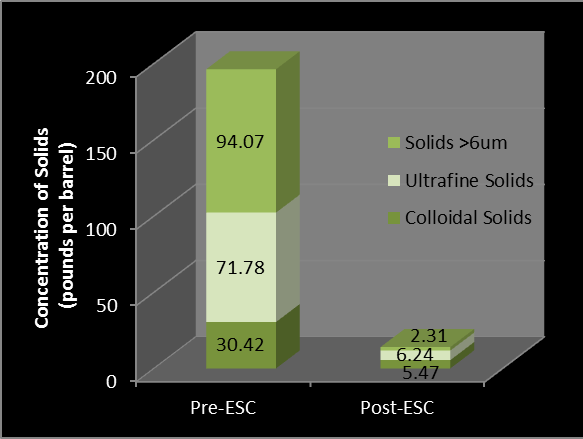LGS Removal in Spent Mud by ESC
Ground Effects successfully demonstrated the Electro Separation Cell Technology to treat spent fluid from drilling operations in the Gulf of Thailand. Low gravity solids in the feed mud, totaling 20%v/v, were reduced to 4.25%v/v. The recovery rate of the base oil was 82% of the available oil from the original fluid.
The Situation
The Gulf of Thailand contains complex geology where rich hydrocarbon deposits are found. The leading producer in Thailand, drilling more than 300 wells per year, focuses on maximizing efficiencies with minimum capital investment. As such the drilling operations must be reliable and efficient.
As the offshore environment places serious demands and constraints on drilling operations, new efficiencies must be found. Extended reuse of drilling fluid systems results in extensive accumulation of low gravity solids (LGS) to the point where they cannot be removed by conventional solids control equipment. Typical options to reduce this risk is to dilute the fluid system, creating three or four times the original volume on a drilling platform where space is limited, or disposing of the fluid system and building a new system from scratch.
Both options are extremely expensive. In the Gulf of Thailand, major issues arise that affect the drilling operations such as reducing the rate of penetration,
differential stick of the drill pipe and loss circulation can cause substantial time lost, make drilling in this environment uneconomical. OBM waste
must be transported and disposed of, adding more cost to drilling operations.

The Solution
The Electro Separation Cell (ESC) technology, recovers valuable base oil for reuse and/or resale. The ESC uses electrokinetics to destabilizes the bonds within the OBM emulsion and separates out the base oil from the native clays and drilling solids.
The ESC focuses on colloidal and ultra fine LGS of less than 6 microns. The result is clean base oil. The reduction in costs and improvement of operational
efficiencies is substantial. There is a 60-70% reduction of waste produced, reducing storage, disposal and transportation costs.

The Results
Other key performance indicators achieved by the ESC Technology during this treatment process were:
- Recovered oil quality unchanged from original
- OBM properties
- before ESC: 67.5/12.5/20 %oil/%water/%solids
- after ESC: 94.5/1.25/4.25 %oil/%water/%solids
- Average of 5600kg of solids removed per day
- Density: before ESC: 10.50ppg; Recovered base oil: 6.96ppg
- Disposal volumes reduced by 60-70%
- Reduced the costs and liability associated with storage, transportation and disposal of full fluid volume
- Proven, viable solution for dealing with high LGS content fluid systems
- LGS in feed mud reduced from 20% to 4.25% v/v
- Average of 5600kg of solids removed per day
- Final density 6.96ppg
- Process rate 617 to 754 bbl per day equivalent
- Disposal volumes reduced by 60 to 70%
| ESC Run Capacity per Unit | 1M | 3M | 5M | 10M |
|---|---|---|---|---|
| Gallons per minute (GPM) | 1.1 to 2.2 | 3.3 to 6.6 | 6 to 11 | 18 to 22 |
| Barrels per day (BPD) | 38 to 76 | 113 to 226 | 189 to 377 | 617 to 754 |
| Liters per minute (LPM) | 4 to 8 | 12.5 to 25 | 21 to 42 | 68 to 83 |
| Cubic meters per day (m3/day) | 6 to 12 | 18 to 36 | 30 to 60 | 98 to 120 |
